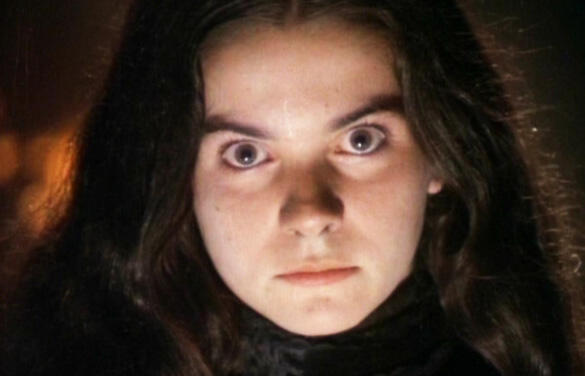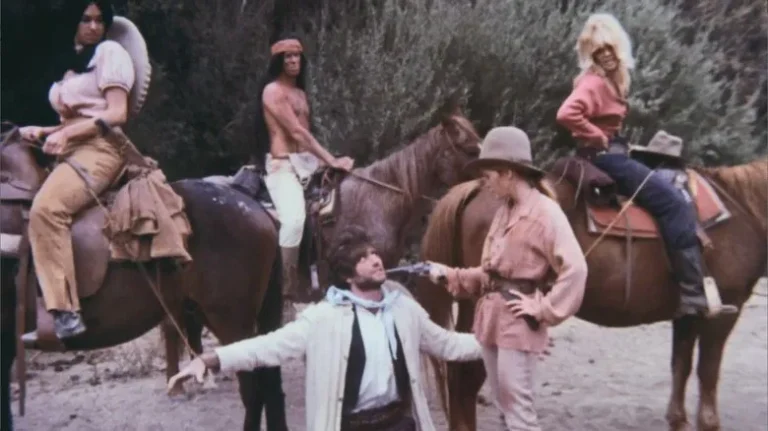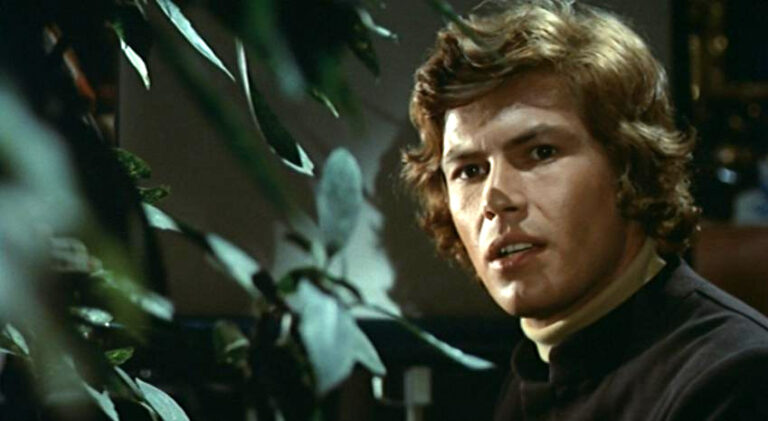Directed by Juan Lopez Moctezuma
Written by Alexis Arroyo and Juan Lopez Moctezuma
Starring:
- Tina Romero as Alucarda / Alucarda’s Mother
- Susana Kamini as Justine
- Claudio Brook as Dr. Oszek / Hunchbacked Gypsy
- David Silva as Father Lázaro
- Lily Garza as Daniela Oszek
- Tina French as Sister Angélica
- Birgitta Segerskog as Mother Superior
Rating: ![]()
Juan López Moctezuma’s Alucarda is a sacrilegious fever dream—an uncanny, chaotic exploration of the female psyche at the threshold of puberty, framed through the metaphor of demonic possession. An English-language Mexican horror film brimming with hysteria and half-formed blasphemy, it is as much a delirious cri de cœur against religious repression as it is a gory fantasia of pubescent desire, anchored by a tone of lurid excess.
Tina Romero plays the eponymous Alucarda, a gothic orphan raised within the shadowy confines of a Catholic convent, whose morbid curiosity about death and the supernatural entwines with her burgeoning sexuality. Dressed in perpetual black and drawn to the macabre, she discovers—alongside her cherished companion Justine (Susana Kamini)—the seductive inversion of Christian doctrine. Their bond, at once romantic, spiritual, and unholy, spirals into satanic debauchery after an encounter with a buried crypt, setting the stage for a descent into possession, martyrdom, and metaphysical hysteria.
Visually, the film’s expressionistic sets, cloistered corridors, and crimson-drenched catacombs evoke a gothic surrealism. Its iconography hovers between the profane and the baroque, suggesting a symbolic realm more allegorical than literal. Yet for all its atmospheric gestures toward allegory—religious ecstasy versus scientific rationalism, female erotic awakening versus ecclesiastical repression—Alucarda remains undermined by its own inelegant theatrics.
Moctezuma directs with reckless abandon, leaning into a style that is less operatic than operose. The framing is theatrical, but not in the controlled, stylized sense; instead, the performances lurch into shrill, ceaseless mania. The cast—nuns, novices, and devil-worshippers alike—rarely speak so much as wail, screech, and contort themselves in a frenzy of performative possession. Far from unsettling, this cacophony becomes numbing, a parody of spiritual terror. What might have been a potent psychosexual fable collapses into a parade of pantomimed heresy.
The film’s anti-narrative structure, which aspires to surreal abstraction, often lapses into incoherence. It gestures toward philosophical subversion—diabolical phenomenology, repressed sexuality, sacrilegious awakening—but fails to articulate what, if anything, it is truly denouncing. The shrieking tirades and ritualistic absurdities seem less like critique and more like empty provocation. And yet, amid the cacophony, Tina Romero’s Alucarda occasionally conjures something genuinely eerie. In her quieter moments—whispering to Justine, inviting her into forbidden knowledge—the film brushes against an almost oneiric beauty, a sapphic fairytale cloaked in black velvet.
But such glimpses are fleeting. Alucarda is too theatrical, too derivative—its climax a discordant mélange of The Exorcist and Carrie—and ultimately too contrived to offer a truly provocative meditation on its themes. For all its convulsing nuns and blood-soaked altars, the film’s hysteria is more exhausting than transgressive.
It’s a fascinating artifact of cinematic heresy, certainly—but one whose most powerful moments are buried beneath layers of incoherent shrieking and gothic kitsch.









